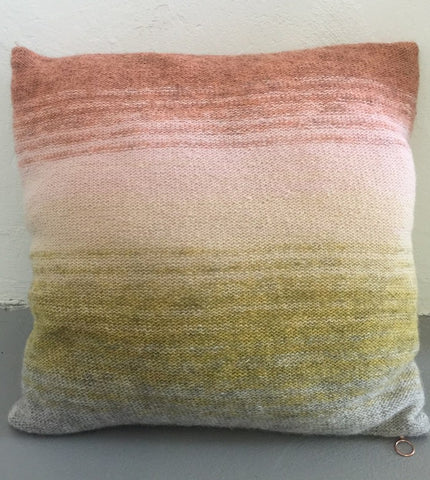Dip dye knitting - learn the techniques

In January, we focus on learning new knitting techniques. It is one of our own New Year resolutions; to continue to challenge ourselves with new techniques. You can therefore find a series of posts about knitting techniques and how to get started at our knitting blog.
One technique that we are quite fond of at Önling is the 'dip-dye' technique and we have several designs in which this technique is used. It's a fun - and easy - technique where you play with endless color experiments, making the colors blend into each other in the most beautiful way.
One of our absolute favorites is the beautiful Dip dye sweater, which is shown below. The sweater is worked in Önling No 2, 100% soft merino wool.

Dip Dye technique explained
- We call it Dip dye because it looks as if the product has been dipped in paint / dye, whereby the smooth color sequence has occurred.
- The smooth blend of colors is obtained by knitting with two threads of yarn at the same time while following a described color sequence, where you alternately knit with two threads of the same color and a thread of each color. This way the gradual color change is achieved
- You work in stockinette stitches all the time. The front of the work is actually the side where you have the purl stitches.
- You get the best Dip Dye result if you use a minimum of 4-5 colors in an even color sequence.
Choosing colors for dip dye
When you knit Dip Dye, it is important that you have considered which colors you want to work with.
You can choose colors that are all within the same color tone, eg different shades of blue, but you get the best result if there is a good contrast between the color you start and end your knitting project with.
Find inspiration in the color circle
If you need input for selecting colors, take your point of departure in the circle of color and consider the following:
- Colors that are placed right next to each other in the circle (for example purple and blue or red and orange) are called color groups. They work well together.
- Colors that are located at a 90-degree angle to each other work well together. For example, orange and green. You can use all square combinations, where there is an equal distance between the colors.
- Complementary colors are placed directly across from each other in the color circle, and they work well together. For example, red and cyan blue, green and magenta or orange and blue.

Learn Dip dye techniques by video
When knitting Dip dye, there are relatively many color changes, and thus many ends that need to be weaved in. If you want to save time weaving ends as you finish your knitting, check out this video, which show you how to weave in ends as you knit.
Pretty dip dye designs to get you off the ground
If you want to get started on a dip dye project, we have a number of designs on our webshop that we recommend. As always, you choose which colors to include in your kit.
One place to start is with the beautiful chunky Dip dye cardigan on large needles, knitted in our sustainable yarn Önling No 2.
One of our absolute favorite dip dye designs is the pretty Aud cardigan. The Dip dye effect on the yoke continues further down on the back than in the front and the result is a long cardigan in a classic and beautiful design.
We have also played with the dip dying technique in various accessories. Here are examples of our dip dye mittens and matching dip dye scarf.
PS: Both the pattern for the dip dye mittens and the scarf is free at Önling. See them - and other free patterns free knitting patterns here💝






